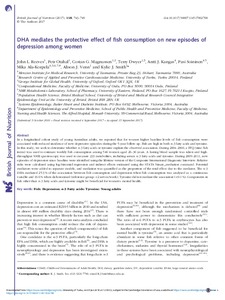DHA mediates the protective effect of fish consumption on new episodes of depression among women
Smith KJ; Dwyer T; Kangas AJ; Magnussen CG; Reeves JL; Ala-Korpela M; Otahal P; Venn AJ; Soininen P
https://urn.fi/URN:NBN:fi-fe2021042717870
Tiivistelmä
In a longitudinal cohort study of young Australian adults, we reported that for women higher baseline levels of fish consumption were associated with reduced incidence of new depressive episodes during the 5-year follow-up. Fish are high in both n-3 fatty acids and tyrosine. In this study, we seek to determine whether n-3 fatty acids or tyrosine explain the observed association. During 2004–2006, a FFQ (nine fish items) was used to estimate weekly fish consumption among 546 women aged 26–36 years. A fasting blood sample was taken and high-throughput NMR spectroscopy was used to measure 233 metabolites, including serum n-3 fatty acids and tyrosine. During 2009–2011, new episodes of depression since baseline were identified using the lifetime version of the Composite International Diagnostic Interview. Relative risks were calculated using log-binomial regression and indirect effects estimated using the STATA binary_mediation command. Potential mediators were added to separate models, and mediation was quantified as the proportion of the total effect due to the mediator. The n-3 DHA mediated 25·3 % of the association between fish consumption and depression when fish consumption was analysed as a continuous variable and 16·6 % when dichotomised (reference group: <2 serves/week). Tyrosine did not mediate the association (<0·1 %). Components in fish other than n-3 fatty acids and tyrosine might be beneficial for women’s mental health.
Kokoelmat
- Rinnakkaistallenteet [19218]
